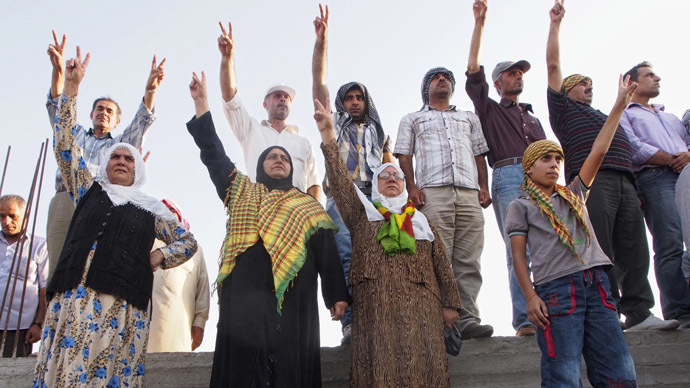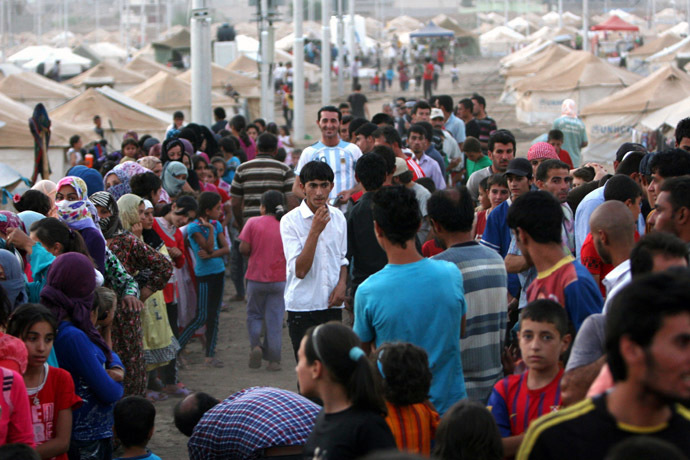Syrian Kurds face ‘ethnic cleansing’ by Islamist groups – party leader

Syrian Kurds do not support either the government or the rebels, but only want to protect themselves from massacres and ethnic cleansing by Islamist rebel groups, who ignore all democratic principles, says Syrian Kurdish leader Saleh Muslim.
While there is no end in sight to the bloody Syrian conflict, another front in the civil war has erupted within the country – between the Kurdish militia and Islamist rebels in Northern Syria. Al-Qaeda-affiliated Islamist groups operating in the country, including the al-Nusra Front, are trying to capture Kurdish territories and make them part of an Islamist state they want to create in the region.
“The Kurdish people have only one objective – to protect ourselves and our homes,” Saleh Muslim, the head of the Kurdish Democratic Union party, told RT Arabic. “Our people, our villagers suffer vicious assaults. They are chased out of their homes. They become victims of massacres and ethnic cleansing. Everything connected to the Kurds is being destroyed.”
In the 1980s, Saddam Hussein’s regime waged a similar campaign against the Kurdish people in Iraq, Muslim recalled, adding that terrorist groups in Syria support those massacres.
Seeking shelter from brutal violence in their homeland, over 40,000 Syrians – the vast majority believed to be Kurds – have poured into neighboring Iraq's autonomous Kurdish region within the past two weeks.
“Those who attack us and our homes have no respect for democracy or freedom; they have no respect for anything. It’s as if these people were from a different planet,” the Syrian Kurdish leader stated. “All that we have said and done from the very outset was to protect ourselves both from the regime and from these forces.”
Since the very beginning of the Syrian conflict, the Kurds have never sided with President Assad’s regime, Muslim said.
“They were part of the Syrian revolution that pressed for regime change and reforms in Syria. Today, our views remain the same,” he added.
The Kurds are also against any foreign military interference in the conflict, Muslim said.
“People talk a lot today about a possible strike on Syria. Syria is our homeland, and since day one of the conflict we’ve rejected foreign military intervention in any shape or form, because this may leave the country and the entire region completely devastated,” he told RT Arabic.

Speaking about the August 21 alleged chemical weapons attack on the outskirts of the capital, Damascus, Saleh Muslim said it could be used “as a pretext to launch this strike against Syria.”
“We demand an independent and unbiased investigation of such incidents,” the Syrian Kurdish leader said.
“We support the demand to identify the criminals who committed these crimes and determine who used chemical weapons in reality.”
He added that the people behind the alleged chemical attack should “face the Hague Tribunal for their crimes against humanity.”
Muslim said that there had been false reports in the media claiming that his party justified “the regime and their use of chemical weapons.”
“We have never made any such statements,” Muslim said. “What we said was that we demand an independent and transparent investigation of all the incidents where chemical weapons have been used. All we said was that the authorities would be very foolish to use chemical weapons at Ghouta, just a few miles away from the international group of experts who came to investigate chemical weapons allegations. This is a very complex issue, which should be thoroughly investigated.”
Speaking about the future of the Kurds – the largest ethnic minority in Syria – Muslim said that they are not seeking to break away from the country.
“We live on Syrian territory and we are part of the Syrian people. Regardless of what some people say, we’re not looking to break away from Syria. We are a part of this country, and we are one of the stakeholders in the Syrian crisis settlement process,” said Muslim.
He argues that it is impossible to have a democratic society in Syria without resolving the Kurdish issue, however.
“Everybody should realize this, including our neighbors,” Muslim said.
The statements, views and opinions expressed in this column are solely those of the author and do not necessarily represent those of RT.












